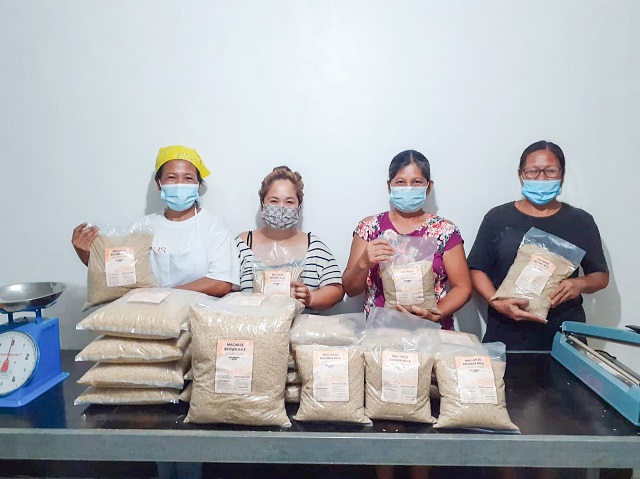
Darkness starts to engulf the remaining light of the day but the rustles have not slowed down a bit inside the Pinagbuklod na Adhika Multipurpose Cooperative (PNAMC) facility in Macarse, Zaragoza, Nueva Ecija. The last sack of palay was poured into the brown rice milling machine. Several women can be seen filling plastic bags labeled “Macarse Brown Rice”.
In a transformed food system that is gender-responsive, opportunities are given to women to help them become key players in the value chain; breaking from their usual roles as mere producers. Among the women working on brown rice trading are Marites A. Benico, 41, and Merlita I. Ulip, 51, who used to be only involved in rice farming.
Marites shared that she has been with the cooperative since 2016.
“We moved to this place from nearby Barangay Del Pilar in 2013 to try our hands at farming. My husband’s grandparents have a 2-ha farm here,” she said.
Merlita, on the other hand, grew up in Macarse. She has been helping in the farm since she was a child until she decided to work in Manila at 17 and eventually went abroad. She was an overseas Filipino worker until 2010 when she had to take care of her aging mother as her two siblings had their own families.
“After a year, I decided to take over the 3-ha rice farm my mother was managing,” she recounted.
A step up with RiceBIS
It did not occur to both Marites and Merlita that there could be more to rice farming.
“I grew up contented with harvesting enough for our food, with a little excess that we can sell for other needs. It did not cross my mind that we can harvest more than we used to,” Merlita said.
In 2017, both ladies participated in the training courses offered by DA-PhilRice’s Rice Business Innovations System (RiceBIS) Community Program.
“Before RiceBIS, harvest from our 2-ha farm has been 180-200 cavans (58- 59kg each). Now we harvest 200-230 cavans,” Marites recalled.
The same can be said of Merlita.
“We used to harvest around 200 cavans (58-60kg each). When we applied what we learned during our RiceBIS training activities, our harvest shot up to 300 cavans,” she said.
She added that her expenses for agricultural inputs were also reduced.
“Before RiceBIS, we sowed too much seeds. Now, we learned to reduce it. We also learned to lessen pesticide application,” she related.
More than production
Marites and Merlita are thankful that their produce is increasing. However, there was one problem.
“We were at the mercy of palay traders. We could only gain more if the price of palay increased. For us to sell our produce at a higher price, we should process them on our own,” Merlita said.
With this observation, she remembered, their cooperative tried palay buying in 2019.
“We saw how our profit increased, individually and as a group. We are now trying to acquire a facility for palay storage so that we can continue this business. Now, our products are brown rice and rice brew,” she narrated.
“We’re still just starting to market our products, but we are thrilled that more customers are ordering in bulk,” Marites cannot hide her excitement as she rejoiced at the achievement of their group.
She added that by processing part of their produce to brown rice, they are able to sell it at P50/kg compared with P16-P19 if sold as palay to the traders.
Learnings for life
For Marites, the impact of joining government programs on her life is more than their group’s success.
“Joining RiceBIS made me realize that I can do more things as an individual for my family and community. When I got married at the age of 18, I thought my life would only revolve around staying at home and taking care of my kids and my husband. But now, I learned that I could achieve more,” she disclosed her aspiration.
With her cooperative membership, she feels fulfilled.
“After I learned the basics of how to be an entrepreneur, I started my own business. I make espasol and leche flan so I gain additional profit,” she said.
She confided that in her journey, she also encountered challenging times. “We struggle at first but if we make it prosper, we can help others to do better too,” she stressed.
In terms of rice farming, she learned to be open-minded.
“We should not limit ourselves to producing and selling to traders. We can also process our produce, we can think of other ways and be smart in our decisions,” Marites said.
Merlita also shared how she is delighted that they are also able to help other farmers in their community.
“I encourage other farmers to join farmers’ groups or cooperatives and government programs because with this, they can learn and earn more than they used to,” she said.
The hustles and bustles of daily life are not new to these women, but with this new endeavor, as the last pack of brown rice is sealed and the rustles fade, their cheerful voices chorus a new spark of hope and aspirations.




